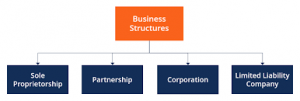NIGERIAN BUSINESS STRUCTURE
 NIGERIAN BUSINESS STRUCTURE
NIGERIAN BUSINESS STRUCTURE
The legal shape that a firm will take in order to operate is referred to as its structure. It explains what the company’s legal, financial, tax, and other duties will be. It is one of the most important decisions to make when beginning a company. The size, kind, and industry requirements of a business, as well as personal preferences, all influence the structure is chosen. It is permissible for a company to change its business structure in response to changing circumstances.
Unfortunately, based on my experience, it appears that many entrepreneurs do not give the business structure much care. In the long run, this might have serious consequences for a company.
Before we go into business structures, it’s crucial to remember that a company must meet the following legal requirements:
- The company is required to be registered with the Corporate Affairs Commission
- The company has a Tax Identification Number (TIN) – this is required.
- The size and scope of the activities are comparable to those of other enterprises in the industry.
- keep a business bank account distinct from your personal one
- possess the necessary licenses or credentials
- Maintain business records and ledgers.
- Working from a commercial location
If your business lacks any of the above traits (especially the first two), it may be considered as a hobby, and continuing to engage in business-like activities without registering as a business may result in tax penalties.
From a financial standpoint, the business structure determines a business owner’s responsibilities, potential personal liability, asset protection, operating costs, regulatory obligations, tax liabilities, and so on.
Business Names, Incorporated Companies, and Incorporated Trustees are the three major kinds recognized by Nigerian law, and each has implications for finance and accounting.
- Business Names
The fact that businesses registered under Business Names are not independent legal entities under the law is their most distinguishing attribute. They are simply the owners’ extensions. The owners are individually liable for the company’s losses and obligations.
Check the availability of a business name as a trademark, business name, and domain name before making a decision (website address). It is preferable to use a different name if the name has already been registered as a trademark in Nigeria by someone else in a class relevant to your firm. If a name is registered as a trademark in relevant classifications, it may grant that name exclusive rights in those classes. Only registering a business name, a company name, or a domain name gives you no exclusive rights.
There are two types of business names:
- Sole Proprietorship
- Partnership
Sole Proprietorship
A sole proprietorship is the most basic business structure, and it is relatively straightforward and inexpensive to establish. A sole proprietor is legally liable for every part of his or her company. He or she is typically the one who makes all of the choices about the start-up and operation of the firm, as well as employment. It is the most popular option for new entrepreneurs or those who want to supplement their regular income with a side business.
When deciding on the best business structure, you must first consider and answer the following questions:
- What are your company’s short, medium, and long-term objectives?
- Are you aiming to make a profit by paying dividends or wages, or are you hoping to make a profit by selling your company?
- What impact will the structure have on your tax obligations?
- How much does it cost to set up and maintain the structure?
- Will the structure aid in the protection of your assets and the limitation of your personal liability?
READ ALSO: FEASIBILITY STUDY ON RICE FARMING IN NIGERIA
 NIGERIAN BUSINESS STRUCTURE
NIGERIAN BUSINESS STRUCTURE
BUSINESS STRUCTURE TYPES
The Companies and Allied Matters Act, Cap C20, Laws of the Federation of Nigeria, 2004 (CAMA) is the main law that controls Nigerian corporate entities. The following are Nigeria’s various business structures:
- Sole Proprietorship: This is the most basic of the business structures offered. A Sole Proprietor is an individual who controls and conducts a business under his or her own name. The company name does not have its own identity. The debts of the business are the sole responsibility of the sole proprietor. The construction is less costly and simple to erect. Traders, home enterprises, and other small firms can benefit from this business form. An expanding company, on the other hand, may not be able to accommodate the same.
- Partnership: This is a group of two or more people who work together as a partnership under a company name. The partners are jointly and severally liable for the business’s debts, just as they are in a Sole Proprietorship. As a result, it’s crucial to think carefully about who you join a partnership with because all partners are equally liable for the activities of the others. A partnership agreement should be in place that spells out how the relationship will operate. The maximum number of people that can form a Partnership is twenty.
iii. Limited Liability Partnership: Partnerships in Lagos State, Nigeria, can be registered as limited liability partnerships under the Partnership (Amendment) Law of Lagos State (2009). This also gives the partnership a separate legal identity from its partners. Although this type of partnership is not recognized under the present CAMA, a measure is currently being debated in the National Assembly to include it in the Company Allied Matters Act.
- Company: A corporation is a legal body that exists independently of its members, often known as shareholders. A corporation can be a private corporation, a limited liability corporation, or an unlimited corporation. As a result, the shareholders’ liability is limited to the amount of their unpaid or paid shares, accordingly. The minimal number of people required to create a company is two (Two). However, a bill in the National Assembly proposes that only one person be allowed to start a company. Persons founding a corporation must be over the age of 18 (eighteen). This business structure is appropriate for large firms, high-risk businesses, and those wishing to expand and scale their operations. The flexibility to generate funds and grow through the issuance of shares also makes the company structure ideal for new firms. However, a corporation must always have a Shareholders Agreement that spells out each shareholder’s rights and responsibilities.
A business can also be a public company with a minimum of 50 (Fifty) members. It can sell its stock to the general public and trade on a stock exchange. The expense of running a Public Limited Company is higher than that of a Private Limited Company. As a result, it is better suited for huge corporations. A Company Limited by Guarantee is another option. This is a non-profit corporation that mostly serves charitable groups.
NIGERIAN BUSINESS STRUCTURES’ NATURE
Depending on the country of origin of the company you’re dealing with, you’re likely to encounter a range of distinct business forms in Nigeria.
Multinational subsidiaries will most likely adopt many of the parent company’s features but will retain a distinct local flavor.
Indigenous Nigerian businesses, on the other hand, would have their unique approach and flavor. As befits a country rich in tribal heritage and culture, all native Nigerian enterprises would exhibit significant hierarchical tendencies. As a result, the boss expects and receives respect from those in the hierarchy below them. Managers are frequently of the older generation, as age is highly revered in Nigerian society — age provides knowledge. People in middle management try to give the appearance that they have a lot of authority in the company, but this is rarely the case. Decisions are almost always made at the top, so don’t waste time attempting to persuade more junior people to make them. If at all possible, start at the very top.
This does not, however, mean that those at the bottom of the corporate ladder should be overlooked, since they may play a key role in influencing the ultimate decision-maker. As a relationship-oriented culture, it’s critical to demonstrate that you’re working hard to build positive relationships at all levels of the company.
If you need a service of a Professional Business plan writer, then Dayo Adetiloye Business Hub is the place to go Call or WhatsApp us now on 081 0563 6015, 080 7635 9735 or send an email to dayohub@gmail.com and we will solve any of your business plan problems.
Hope you enjoy this article?
Share your thoughts in the comment session.
Contact us today for your business consultancy and business advisory services. We can help you fine-tune your idea, structure your business, market your business, train your staff, consult on your retirement plan, coach you for financial success. We also write a business plan and help with fundraising strategies and Grant applications. We can help you start, grow, and expand your business.
Call or WhatsApp us now on 081 0563 6015, 080 7635 9735 or send an email to dayohub@gmail.com and we will solve any of your business problems.
Related